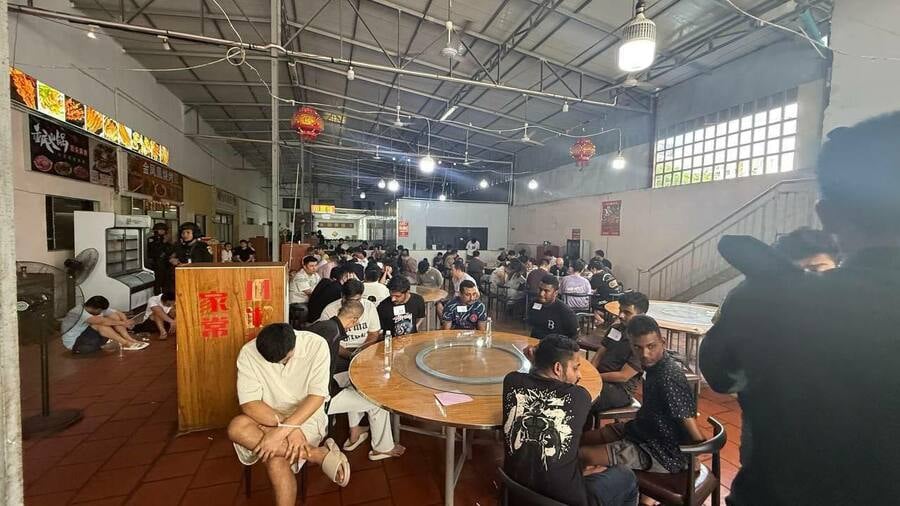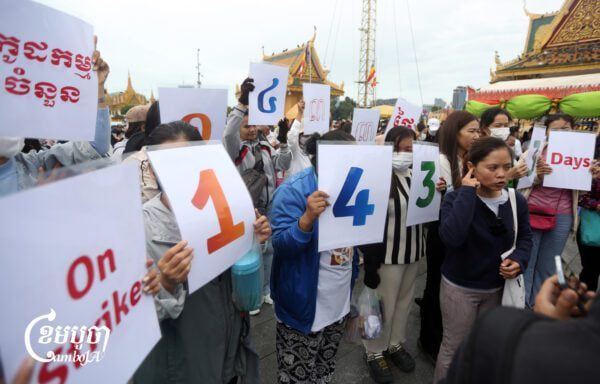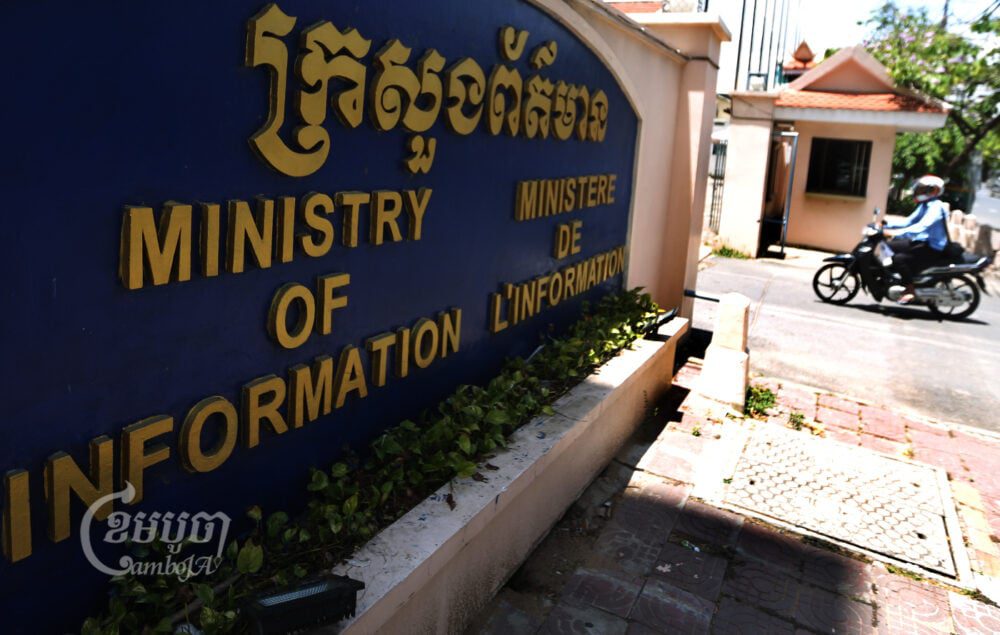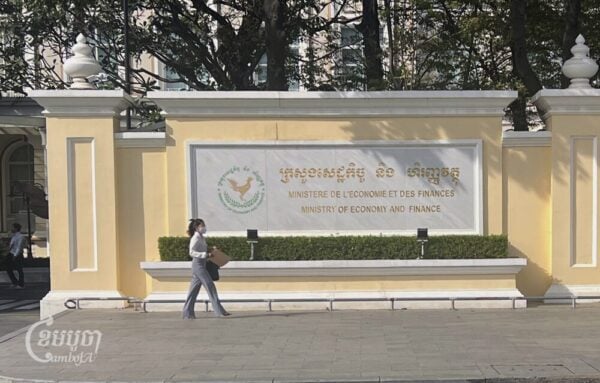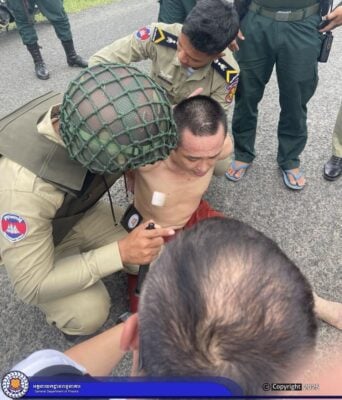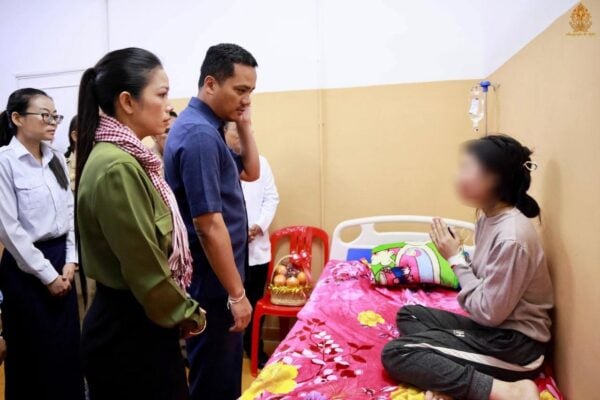Listen to the audio version of this article (generated by AI).
Cambodian authorities arrested at least 658 foreigners from two suspected online scam compounds in Bavet City, Svay Rieng province, following a major police operation earlier this month. The raid occurred when footage of people fleeing a scene amid gunfire went viral, highlighting renewed tensions in the border city long associated with online fraud networks.
A local media video on November 8 showed foreign nationals believed to be Chinese and Vietnamese fleeing from two buildings, one of them called Li Zhou, on Kampong Spean Road, as security forces surrounded the area where gunfire was heard. People were seen running, some scrambling up to rooftops, and carrying sticks during the incident.
In the footage, dozens of people can be seen scrambling across the rooftops and running in panic, some carrying sticks as they attempt to escape.
An earlier video shared on social media on October 30 showed security guards chasing and beating men fleeing from a suspected scam compound in Venus Park in Bavet, a site that has previously experienced worker unrest. Authorities said an investigation into the incident is ongoing.
The compounds operating under Venus, allegedly linked to the nearby Venus Casino, have been raided multiple times in the past. Cambodia and Vietnam have conducted joint operations with the arrests of dozens, leading to online fraud convictions in Vietnam, and the repatriation of hundreds of people believed to have been trafficked into forced criminal work.
Bavet City Police Chief Em Sovannarith and Men Eng, deputy governor of Svay Rieng province, did not respond.
Interior Ministry spokesperson Touch Sokkhak confirmed that 658 people were nabbed in connection to online scams activities in Bavet, a city bordering Vietnam, on November 7, which “showed Cambodia’s determination to eliminate telecommunications fraud”. Most of those arrested were foreigners, comprising Japanese, Filipinos, Vietnamese, Singaporeans and Chinese.
He told CamboJA News that an operation was carried out on November 4, 2025, by a working group from the ministry’s Commission for the Suppression of Online Scams which collaborated with the National Police and Svay Rieng Provincial Police. It was coordinated by the Deputy Prosecutor of Svay Rieng Provincial Court.
According to him, police experts assessed that the online fraud was carried out by workers impersonating police to threaten victims abroad.
In a building on a concrete road in Bavet Kandal Village in Bavet commune, police picked up 57 people from six countries, including 15 women, and 12 Cambodians employed in sanitation, security, and translation roles.
On Kampong Spean Road in the same village, a site which houses nine twin buildings, officers rounded up 601 people from four countries.
From the first location, authorities referred two Chinese nationals and two Cambodian translators to the Svay Rieng Provincial Police Headquarters for legal action. The rest of the 55 foreigners were taken to the Immigration Department for further processing and possible repatriation, while 10 Cambodians were released after receiving educational guidance and no further legal action, as they were employed for sanitation and security work.
At the second location, police identified 509 Vietnamese and 39 Chinese, as well as several Myanmar nationals and other migrants. Police concluded that the site was used for online fraud operations disguised as high-profit investment schemes.
Activities uncovered included the creation of fake bank transaction images, fabricated romantic relationships, registration for fraudulent marathon events, and the use of AI deepfake technology to forge videos and identities.
Following the raid, 71 foreigners — including Chinese and Myanmar nationals — were transferred to the General Department of Immigration for deportation. Another 529 Vietnamese nationals were placed under the supervision of the Svay Rieng Provincial Police while awaiting repatriation.
Some Chinese and Vietnamese suspects were sent to court for further legal proceedings, while 39 Vietnamese migrant workers were released under education contracts allowing them to return to their home country.
“Cambodia is not a safe haven for foreigners to commit online fraud, and it has not created any conditions for criminals to act as they please,” Sokkhak said. “Cambodia is willing to prevent and suppress it, but we seek cooperation between countries, bilaterally or multilaterally, in the region and around the world.”
Sokkhak added that Cambodia will cooperate with other countries to identify and suppress the perpetrators. “[We] want countries to educate their people more about online fraud and sharing and provide technical support to each other, instead of blaming each other.”
Last May, a report by a UN expert stated that the scams are “highly mobile” and “widespread”, with centers in “Sihanoukville, Phnom Penh, Pailin, Anlong Veng, O’Smach, Kandal, Pursat, Koh Kong, Bavet, Chrey Thom, Kampot, Oddar Meanchey, Poipet, Banteay Meanchey, Svay Rieng, and within the Dara Sakor and Henge Thmorda Special Economic Zones”.
Cambodia ranks first in Southeast Asia’s 2025 Crime Index with a score of 51.3, indicating a very serious crime situation, followed by Myanmar (50.9), Malaysia (48.9), and Indonesia (46.0), while Singapore records the lowest crime index at 22.6.
Phnom Penh has established a special committee to crack down on online scams, following an order from Prime Minister Hun Manet.
Sokkhak claimed that in the previous government mandate, Cambodia expelled 21,000 foreigners while the current government expelled 15,000 in more than two years. In the first nine months of 2025, the police suppressed 48 cases of fraud using technology and expelled a total of 2,722 foreigners from Cambodia.
On Sunday, 263 people, including 17 women, were caught in a raid for being allegedly involved in an online scam at the old Galaxy World Casino in Sihanoukville.
Some 207 were Chinese nationals, and others from Pakistan, Bangladesh, Myanmar, Nepal, Vietnam, Malaysia, and one Laotian.
Cambodia has faced scrutiny over the online scam industry, which is estimated to generate between $12.5 billion and $19 billion a year and relies on more than 100,000 forced laborers in the country alone.
Ly Sreysrors, an independent political analyst, welcomed the government’s cybercrime crackdown, noting that law enforcers have shut down 92 locations in 18 provinces and cities and arrested around 3,000 suspects of 20 different nationalities. To strengthen the fight against cybercrime, authorities should enhance regional cooperation to develop coordinated responses.
“One of the big issues we should also look at is senior officials involved in illegal businesses. Thailand recently identified two senior Cambodian officials, Kok An and Ly Yong Phat, as key suspects for further investigation,” Sreysrors said.
The government should also address the involvement of high-ranking officials, pointing out the lack of response to sanctions imposed on Chen Zhi.
“The only effective measures are to [catch] those involved in online scams who are bigwigs. If the locations of fraudulent activities are cleaned up, but no legal action is taken against those behind them, the problems will recur if the authorities are inactive and corrupt,” Sreysrors added.
The U.S. also sanctioned Prince Group, a Cambodian conglomerate, declaring it a transnational criminal organization, and seized over $15 billion in Bitcoin linked to the group’s chairman this month.
Government spokesperson Pen Bona declined to answer and referred the questions to the Interior Ministry.

